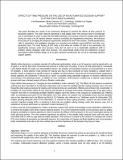Effects of Time Pressure on the Use of an Automated Decision Support System for Strike Planning
Author(s)
Cummings, M. L.; Boussemart, Yves; Donmez, Birsen; Las Fargeas, Jonathan C.
DownloadCummings_EffectOf.pdf (391.7Kb)
OPEN_ACCESS_POLICY
Open Access Policy
Creative Commons Attribution-Noncommercial-Share Alike
Alternative title
EFFECTS OF TIME PRESSURE ON THE USE OF AN AUTOMATED DECISION SUPPORT SYSTEM FOR STRIKE PLANNING
Terms of use
Metadata
Show full item recordAbstract
This paper describes the results of an experiment designed to examine the effects of time pressure on
behavioral patterns. The main research hypothesis is that people under time pressure tend to increasingly
rely on automation in order to cope with the added workload. The context is that of a missile strike planner
having to create a set of matches between resources (missiles) and requirements (missions). We introduce
time pressure by changing the temporal requirements towards the end of the mission. Overall performance,
calls to automation and qualitative strategies are recorded and analyzed using ANOVA and other nonparametric
tests. The main finding of this study is that while the number of calls to the automation did
significantly increase under time pressure, there did not seem to be a statistically significant shift in
problem solving strategies under time pressure. The experimental results show the importance of good
automation-human interface design so as to gain maximum benefit from the use of an automated decision
support systems.
Date issued
2009-04Department
Massachusetts Institute of Technology. School of EngineeringJournal
15th International Symposium on Aviation Psychology (ISAP'09)
Publisher
Curran Associates, Inc.
Citation
Boussemart, Yves, et al. "Effects of Time Pressure on the Use of an Automated Decision Support System for Strike Planning." 15th International Symposium on Aviation Psychology (ISAP'09). April 27-30, 2009 Dayton, Ohio.
Version: Original manuscript
ISBN
9781615672752